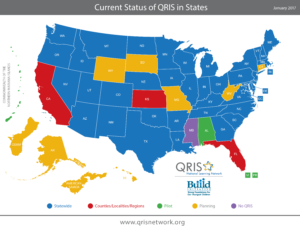Equipping Parents and Kids for Success
Forty-two states have early childhood quality assessment and rating systems. Missouri is one of only eight states without a framework for assessing quality, and prior to 2016 was the only state that banned quality assessment. As a result, parents in Missouri seeking childcare for their young children typically rely on word of mouth and social media platforms like YELP to learn about the quality of providers they are considering. In addition, without a system to measure and improve quality of early learning programs, Missouri has been unable to compete for federal early learning grants most recently missing out on a $75M opportunity. The map below shows the status of quality improvement programs in states across the nation.

The General Assembly took a step in the right direction, passing SB638 in 2016. Rep. Donna Pfautsch’s bill instructed the Missouri Department of Elementary and Secondary Education (DESE) to create a pilot voluntary assessment and improvement system referred to as Quality Assurance Report. However, the program has not been funded and DESE’s work is at a standstill. And now, without an extension of the pilot, the program is in danger of expiring without ever being implemented.
Rep. Pfautsch has a bill (HB1420) to extend the pilot program for three years, giving DESE the time it needs to get the program off the ground.
Why is quality important?
- Quality matters in early care and learning environments: high-quality programs have lasting positive effects, such as greater school success, higher graduation rates, lower juvenile crime, decreased need for special education services later, and lower adolescent pregnancy rates.
- The Achievement Gap is created in the early years: low-quality has harmful effects on language, social development, and school performance that are difficult to ameliorate, especially for children in schools with fewer resources.
- The impact of quality is long-lasting: behavior and academic problems that result from low quality persist until age 15. Teenagers who received higher-quality in the early years were less likely to fight, argue, or be mean to others, as compared to those who received lower-quality care.
- Quality in the early years makes economic sense: Early interventions have much higher economic returns that later interventions such as reduced pupil-teacher ratios, public job training, convict rehabilitation programs, adult literacy programs, tuition subsidies, or expenditures on policing.
- Quality early experiences can help reverse three primary disqualifiers for military service: Currently, more than 70 percent of 17- to 24-year olds in the U.S. cannot serve in the military, primarily because they are too poorly educated, too overweight, or have a serious criminal record, all of which can be prevented by quality early learning.
- Hundreds of business leaders have endorsed early childhood investments: support for quality early learning is an effective use of public resources to strengthen our economy and prepare our youngest children for success in school and in life.


Thank you for your efforts in support of this Quality Improvement Program. It is greatly needed in Missouri.